5 activities to do with your family this Earth Hour

Every year, the world comes together to switch off their lights for 60 minutes as part of Earth Hour, global movement to show their commitment and support for a more sustainable planet.
The event was originally started by World Wildlife Fund (WWF) and its partners, and was first held in Sydney, Australia in 2007. Now it is being celebrated across the globe, with people participating from 180 different countries. Earth Hour will be happening on 27 March 2021, from 830 – 930PM at your local time. The goal of the event is to catalyse a positive change for our environment through standing together as one human race to make a statement for the planet.
If you are thinking of joining this movement with your family this coming weekend, you will be happy to know that there are still plenty of activities that can still be done even with the lights switched off! We put together some fun family-friendly activities that are perfect to help you make the stand and make the experience a little easier even for the little ones.
1. Take a night walk for some fresh respite
With the lights at home all switched off, one of the easiest ways to spend time would be to head outdoors. With social distancing still in place, we recommend avoiding crowded locations but instead opt to explore the neighbourhood parks within the heartlands. Singapore is home to lush nature spaces and green corridors. Our small garden city is home to more than 450 parks and we are sure that there is bound to be one within your estate to take a walk in.
Taking a night stroll in the parks with your family is a perfect after-dinner activity to enjoy the cool breeze while still doing your part for the environment. If a solitary walk is your choice, take the chance to clear your mind and enjoy being one with nature after a long busy week.
2. Have a candlelit family dinner
If dinner is a late affair in your household, a candlelit dinner would be well suited to commemorate the event. Plus, with the children at the dinner table, we think it is the perfect opportunity to share on the significance of this movement and why this dinner is so special with the lights switched off as a dinner topic.

Often, we need to speak with our actions, and we believe a unique dining experience with the lights switched off and breaking out the candles will be the perfect starting point to show why doing their part for the earth is important.
3. A classic movie night
What better time than to suggest a movie night for the entire family this Saturday evening? Spending the night watching a movie not only commits your family to the entire movement, but it could even allow you to clock in twice the amount of time since movies tend to run longer than an hour.

Make the most of the evening by choosing a movie with a green message for the earth! It could make for a great themed movie night to get the entire family on board. Some favourites include WALL-E, Happy Feet and Free Willy. Have the popcorn popping and get comfy among the cushions and look forward to a night of movie fun for the entire family!
4. Reign victorious with game night
With the living space to be darker than usual, a fun way to inject some old-school family fun would be to gather the family for a game night! Card and board games might be the usual picks, but for this special edition of game night take your pick from your favourite virtual games and have a blast. Hot favourites include virtual Chess, Drawful 2 or even Heads Up!

5. Get creative with shadow puppets
With the advancement of technology, children have access to online games, on demand shows and handheld consoles easily. Creating a unique fun experience in the dark would probably be the last on their minds. With the commemoration of Earth Hour, take a step back from the usual and take advantage of the lights being switched off by staging your own shadow puppet show. Let their imagination run and create stories together with the children by using a torch light and upcycling items around the house to illustrate the silhouettes and shadows on a blank canvas.
It truly is a fun activity that can peel the eyes away from the screen for one night and inject some good old nostalgic fun into the world of children today!

Here at Geneco, we encourage you and your family to be a part of this movement. By taking the first step to participate in Earth Hour, it also translates into taking a first step towards building a more sustainable future. With the realisation of the impacts of our every action, it can spur for a more conscious approach on the way we live. Join us this Earth Hour to make your action count towards powering a change for a greener future.
Image Credits: Nylon Coffee Roasters
Source: The Sustainability Project
References:
- 1 (2019) Climate Healers, Animal Agriculture is the Leading Cause of Climate Change – A Position Paper https://climatehealers.org/the-science/animal-agriculture-position-paper/
Global Recycling Day 2021 – Be a Recycling Hero today!
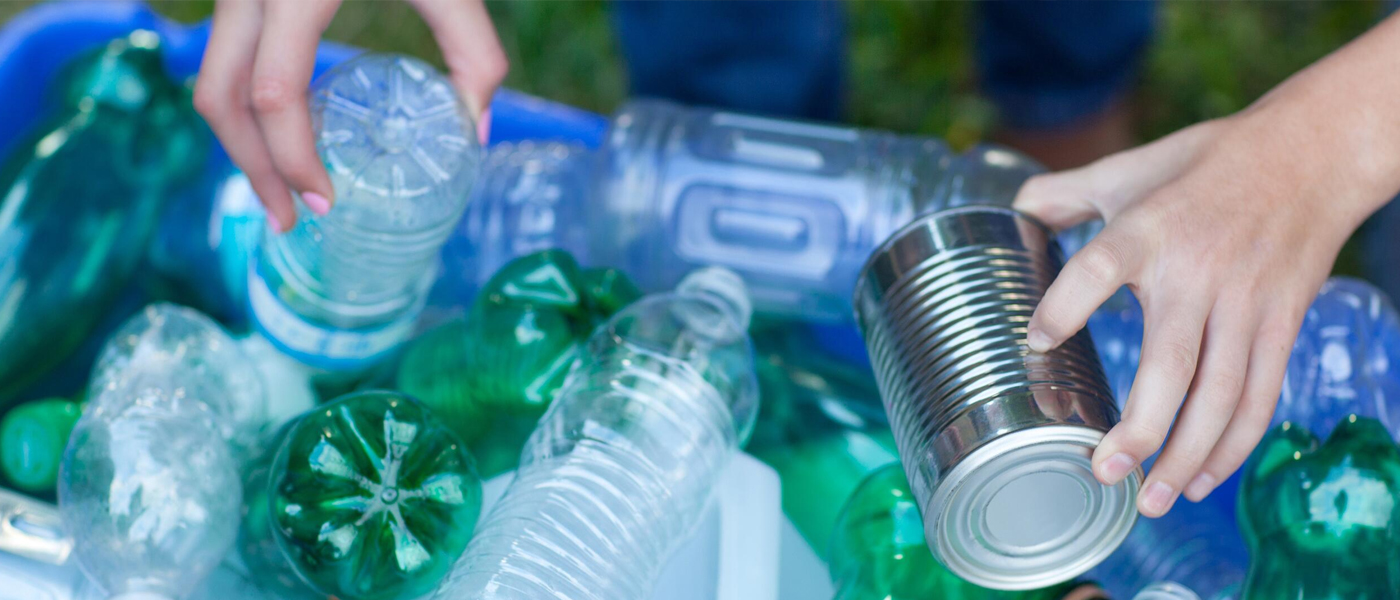
For most of us, we are familiar with the 3Rs of sustainability – Reduce, Reuse and Recycle. While we know that the first two can be easily implemented at home, the idea of the third one might be somewhat foreign to the majority. How much do we really know about recycling in Singapore and do we know what is the right way to recycle?
Global Recycling Day occurs on 18 March every year. The inception of it was with the intention of changing the mindsets of governments, businesses, communities, and individuals — encouraging the adoption of recycling to preserve precious primary resources and not generate more waste. It also aims to reinforce the importance of this issue at a global level and the need for it to be tackled to actualise big changes.
With that in mind, the theme for 2021’s Global Recycling Day is #RecyclingHeroes, where it will focus on celebrating the recycling efforts of people, places and activities all around the world. As Singapore charts forward with the SG Green Plan 2030, let’s find out how we can play a part in this movement too.
The Importance of Recycling
Many of world’s natural resources are finite and non-renewable. This means that once we run out of them, the world will no longer have these natural resources. As with the need to tap on the earth’s natural resources, it gives rise to more problems for our environment such as deforestation and pollution.
Recycling will help in extending the life of something that has been utilised for its initial intention and reduce the dependency on natural resources of our planet.
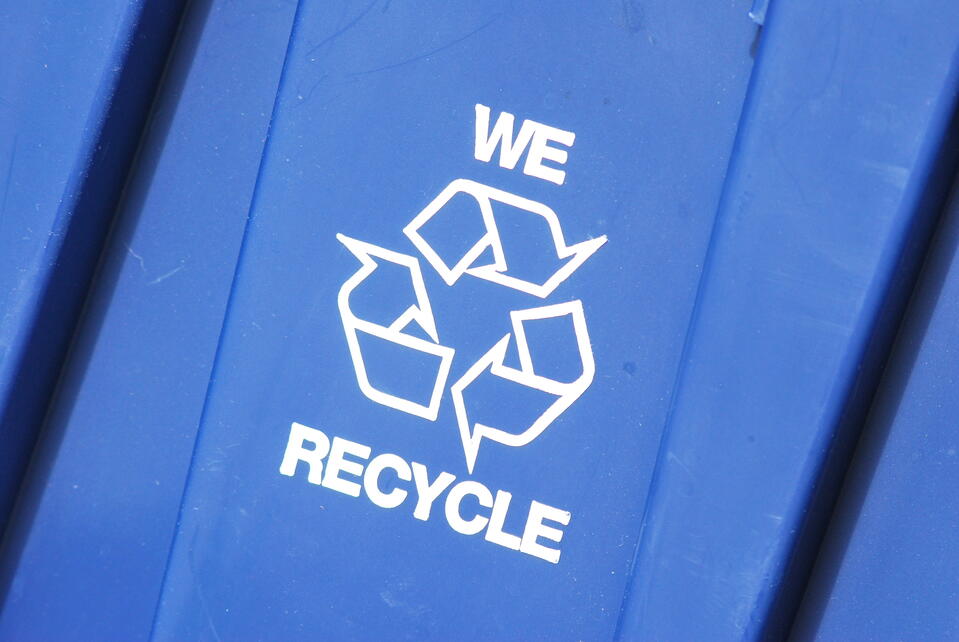
Therefore, it is important to learn how to recycle and the active role mankind plays in preserving our environment. Countries all around the world have rallied its citizens and implemented necessary measures to do good for the earth and encourage a culture of recycling.
- Germany
In Germany, the recycling process is very comprehensive and precise. There are various coloured bins for different types of waste. For example, blue bins for paper, yellow bins for recyclable goods and a different coloured bin for different coloured glass. There are even bins for compostable goods such as food scraps, and boxes for battery recycling in supermarkets. The system may be detailed, but most German citizens are well-informed on how to carry out the process. In fact, up to 56.1% their waste is recycled! [1] - Austria
When Global Recycling Day first launched in 2018, Austria hosted an exhibition to educate the public on the importance of recycling. Today, Austria has a blanket ban on several types of waste going to the landfill – this means that these waste materials must go through recycling. The country also promotes a producer responsibility model, where companies are held accountable for the waste they generate. Companies would collect back the remaining waste from the products they create, and this complete ‘circle’ of responsibility is what is referred to as a circular economy. - South Korea
We often see the characters within Korean dramas sorting out their waste within communal recycling bins. This is not just a scene out of a drama. In fact, the culture of recycling is heavily embedded within the country where the average recycling rate for municipal waste in South Korea stood at over 50% [2] and that number is projected to increase in the near future. Back in 2019, South Korea also launched recycling education packs for local schools, in celebration of Global Recycling Day [3]. Looking forward, South Korea is progressively implementing the banning of plastics, in order to create an eco-friendlier environment. - Taiwan
More than half of Taiwan’s waste is recycled, and it is hard not to see why as this island country has an advanced 4-in-1 recycling programme that includes four strengths: Public Community, Local Authorities (Cleaning Teams), Recycling Enterprises and Recycling Fund. The programme has been launched since 1997, inculcating a culture of recycling among the young people and future generations [4]. These four strengths come together as a collective effort to create a complete recycling network for Taiwan.
Recycling in Singapore
Singapore’s only landfill, Semakau Landfill, is projected to run out of space by 2035. This suggests that Singapore has to find an alternative to our current waste disposal system, and recycling is one of the possible solutions.
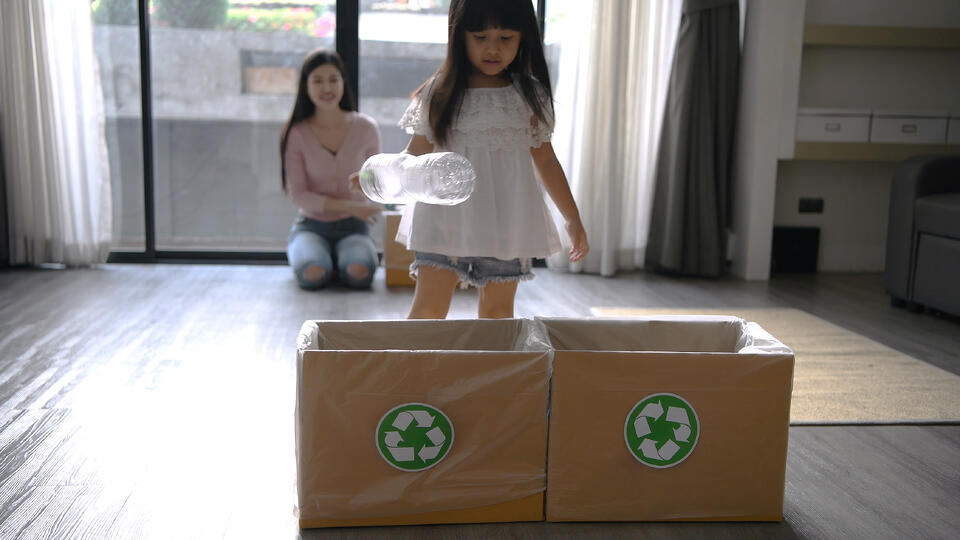
In a study by the National Environment Agency in 2019, it was found that 6 in 10 Singaporean households recycle regularly [5]. However, a significant proportion mistakenly classified items which should be reused or disposed of as recyclables, such as Styrofoam boxes or old clothes. Much education and awareness behind the importance of recycling and the proper way to recycle is still needed within the nation. The inconvenience to dispose your recyclables in the right manner is a small price to pay for the environment’s future.
How to recycle responsibly in Singapore?
Recycling in Singapore can be easy once you are well informed on what can be recycled. If you are unsure whether that plastic soap bottle or biodegradable bag can be recycled, a good place to start is by debunking certain myths on plastic recycling in Singapore or reviewing the things around you that you never knew you could recycle. The more we learn about proper recycling methods, the more we can grow and develop as an eco-friendly community.
To further encourage the rest of your family to be a part of this movement, have a recycling corner within your home to make recycling easily accessible. The steps are easy for the entire family to follow
Step 1: Check the blue bins on what can be recycled (National Environment Agency has even provided a list here)
Step 2: Ensure all items are rinsed and not contaminated with any food or liquids
Step 3: Drop clean recyclables into the communal blue bins
By following these steps, we can help improve our domestic recycling rates, and solve our impending waste disposal issue. Other areas to channel recyclables in Singapore include smart Reverse Vending Machines located across multiple locations in Singapore to drop off plastic drink bottles and aluminum drink cans and be rewarded in the process.
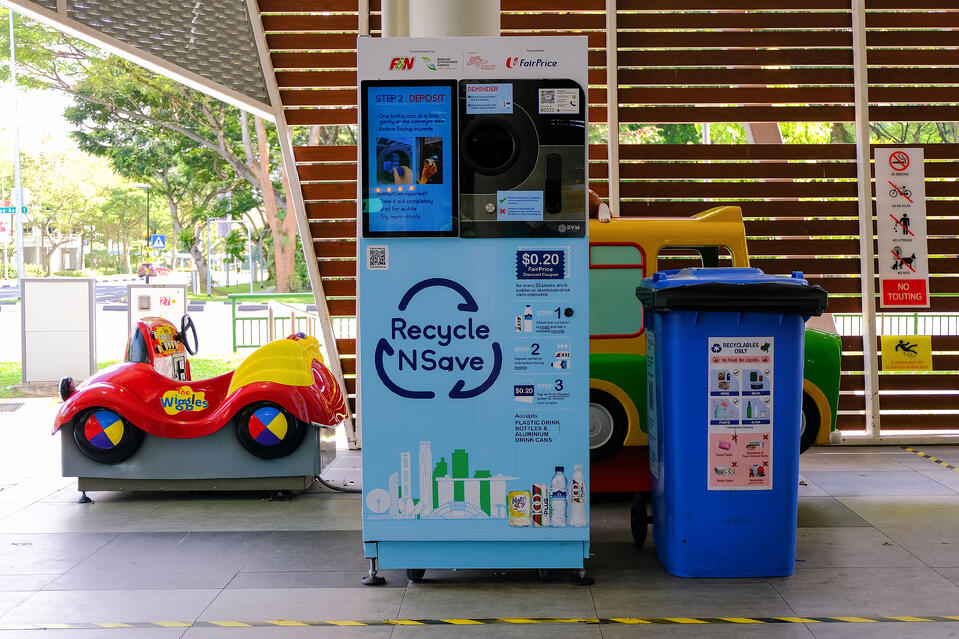
Electronic waste (or e-waste) such as laptops, cables and lightbulbs can be recycled as well. However, instead of dropping them in the communal blue bins across the estates, do take note that the recycling collection method for them is different and blue bins do not accept e-waste.
As the composition of each electrical item is different with some containing a certain amount of heavy metals and other substances of concern, a different recycling channel has been set aside to have these electronic equipment properly treated and recycled. With improper disposal and treatment of the various components, it can lead to environmental pollution and in turn harming human health. As such, various locations with dedicated e-waste recycling collection points across the island has been set up to allow easy drop off of electronics for recycling.
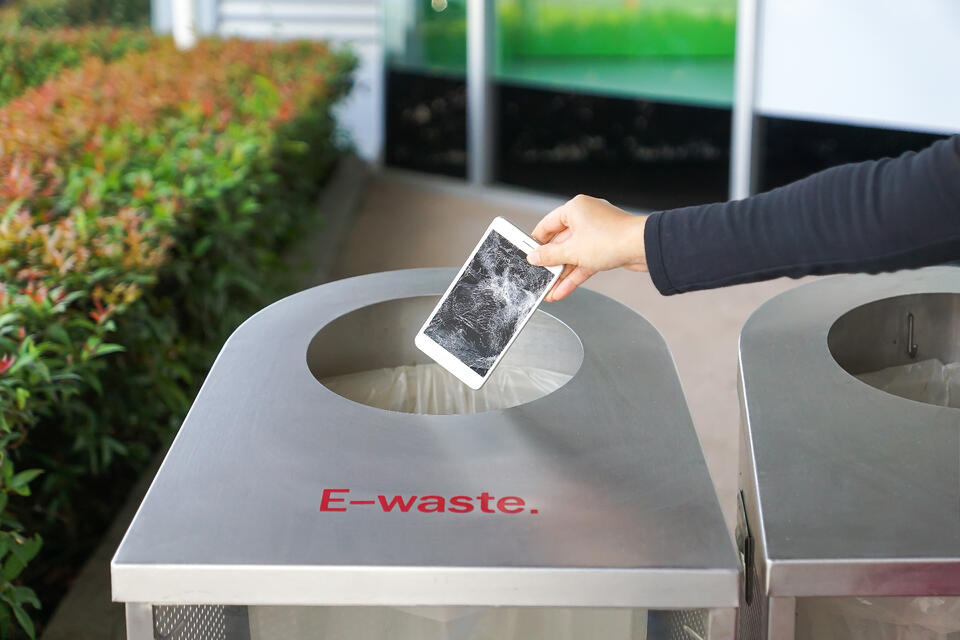
Overall, there is still much room for improvement in terms of the nation’s recycling effectiveness and efficiency. More Singaporeans are increasingly becoming more environmentally conscious and with the launch of the SG Green Plan 2030, it is a testament as a nation to work towards building a more sustainable Singapore. As we work towards this on the upcoming Global Recycling Day, let us all #PowerTheChange and do our part to be our own recycling heroes!
References:
- [1] (2017, December 18) World Economic Forum, Germany recycles more than any other country
https://www.weforum.org/agenda/2017/12/germany-recycles-more-than-any-other-country/ - [2] (2020) Recycling rate of plastic waste in South Korea from 2008 to 2018
https://www.statista.com/statistics/1074985/south-korea-plastic-waste-recycling-rate/#:~:text=The%20plastic%20recycling%20rate%20has,stood%20at%20over%2050%20percent. - [3] Global Recycling Day, GLOBAL RECYCLING DAY STARTS TO ANNOUNCE EVENTS AND ACTIVITIES FROM ACROSS THE WORLD
https://www.globalrecyclingday.com/global-recycling-day-starts-to-announce-events-and-activities-from-across-the-world/https://www.healthline.com/health/heartburn#causes - [4] (2019, June 18) Rapid Transition Alliance, Taiwan’s Transition – from Garbage Island to Recycling Leader
https://www.rapidtransition.org/stories/taiwans-transition-from-garbage-island-to-recycling-leader/ - [5] (2019, April 4) National Environment Agency, 60 Per Cent Of Singaporean Households Recycle Regularly
https://www.nea.gov.sg/media/news/news/index/60-per-cent-of-singaporean-households-recycle-regularly
Image Credits: Nylon Coffee Roasters
Source: The Sustainability Project
References:
- 1 (2019) Climate Healers, Animal Agriculture is the Leading Cause of Climate Change – A Position Paper https://climatehealers.org/the-science/animal-agriculture-position-paper/
